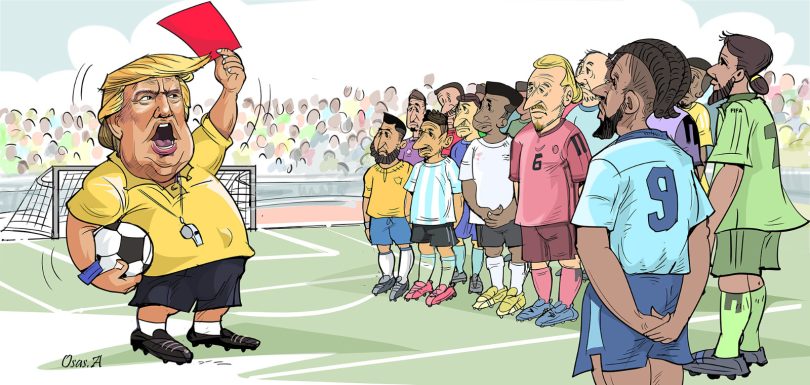For nearly a century, the FIFA World Cup has united nations, fostered global camaraderie, and served as a platform for cultural exchange. But next year’s edition, to be co-hosted by the United States, Canada and Mexico, could test that legacy. CHRISTIAN OKPARA reports that tensions over President Donald Trump’s immigration, trade, and related policies may undermine the tournament’s unifying spirit. Although FIFA has denied plans to relocate the event, fears persist that such policies could dampen fan enthusiasm and cost the U.S. tourism sector an estimated $64 billion by the end of 2025.
Since the FIFA World Cup, often called the World Cup, debuted in 1930 at the behest of the Fédération Internationale de Football Association (FIFA), 80 national teams have competed, while the trophy has been won by eight national teams.
Held every four years since the inaugural tournament in 1930, except in 1942 and 1946 due to the Second World War, the next edition of the competition, a tri-country Mundial, will be held in America, Canada, and Mexico.
As the most widely viewed and followed sporting event in the world, close to half of the global population, that is 3.57 billion people, was estimated to have viewed the 2018 World Cup, while the engagement with the 2022 World Cup was estimated to be five billion, with about 1.5 billion people watching the final match.
Thus far, 18 countries have hosted the World Cup, the most recent being Qatar. Next year, over the course of a month, the football competition played among the senior men’s national teams of FIFA member countries is scheduled to expand to 48 teams.
The World Cup, apart from bringing together countries around the globe and fostering a sense of global unity and shared interest in the sport, also provides a platform for cultural exchange as fans from diverse backgrounds coalesce to support their teams.
Because of the sheer scope of the football fiesta, financial involvement, preparations, and fans’ interest, most host nations are required to agree and sign up to certain rules guiding fans’ and participants’ access to the venues.
These rules include access to the host country, free movement of participants and fans to all the venues, affordable accommodation at the venues, and, most importantly, visa-free acquisition for everyone qualified to be in the host country during the tournaments.
In most championships, including the Olympic Games and FIFA’s World Cup, the accreditation issued to athletes, officials, fans, journalists, and other stakeholders is enough documentation to get the holder into the host country of the championship.
At the Olympic Games and the FIFA World Cup, competition/game ticket holders are also guaranteed easy access to visas. This means that the host country is forced to bend its visa laws to accommodate everybody who qualifies to be at the given competition.
For instance, before the 2018 FIFA World Cup, Russia assured FIFA that it would allow every accredited person and all match ticket holders easy access to the country. The country also agreed to provide free transportation to every venue to all the accredited persons and ticket holders during the competition.
The 2018 World Cup host, Russia, also allowed football fans to enter the country with a game ticket doubling as their visa. So did Qatar four years later. Both governments, however, also performed background checks on all visitors coming for the month-long football tournaments.
In 2022, Qatar, a purely Muslim country, had to adopt a policy that allowed fans access to alcohol, with beer allowed at stadiums and fan zones within the eight stadium compounds (though not at concourse concession stands) before and after games, and during evenings only at the official “Fan Festival.”
Game tickets also allowed access to champagne, wine, liquor, and beer for hospitality clients at Qatar stadiums. The beer policy fulfilled one of the promises Qatar made when it campaigned for the World Cup 12 years before the championship.
Conversely, there are mounting fears that the United States, co-host of the 2026 edition, could make the Mundial unattractive to visitors. This fear is accentuated by the government’s immigration policies, which are threatening to stop fans from entering the country during the championship. As days pass by, fears are growing that the free access to host countries, as stipulated by the various international sporting bodies, is about to be violated by the co-host of the 2026 FIFA World Cup and the hosts of the 2028 Olympic Games.
Trump’s immigration, other policies as concerns
BACK in 2018 when the United States-led bid to bring the 2026 World Cup to North America won the tournament’s hosting rights by a landslide over Morocco with a 134-65 vote at FIFA Congress, geopolitics was seen as a potential wild card, particularly given the inflammatory nature of some of President Donald Trump’s policies and comments with regard to foreign countries, but it turned out to be less of a factor than most thought.
With Trump returning to power, the concerns appear valid as he has caused significant uncertainty regarding immigration policies for foreign visitors planning trips to the U.S. for the two biggest events in sports.
The Trump-led government’s travel ban on citizens from some countries has raised new questions about its impact on the World Cup and the Summer Olympics, which depend on hosts opening their doors to the world.
Although most of the countries listed among those barred from easy access to the U.S., except Iran, may not qualify for the World Cup, FIFA insists that everybody who can afford the ticket, or those accredited for certain jobs in the host country during the competition, needs to gain access to the country.
In as much as some stakeholders argue that the U.S. reserves the right to decide who sets foot on its soil, the new policy on travels to America makes exceptions for “any athlete or member of an athletic team, including coaches, persons performing a necessary support role, and immediate relatives, traveling for the World Cup, Olympic Games, or other major sporting event as determined by the secretary of state.”
American tourism takes a hit from Trump’s policies
ONE of the worst-hit sectors by the Trump administration’s policies is the tourism industry, which analysts say has reached its all-time low in the past two years.
According to AFP, the U.S. tourism outlook for 2025 has worsened due to President Trump’s policies, with foreign arrivals expected to drop by 5.1 per cent and spending falling by 10.9 per cent.
“Tariffs, strict immigration policies, and global tensions are deterring visitors. Canadian tourism is already impacted, while fears of a stronger dollar and recession further dampen travel, potentially costing the sector $64 billion in 2025,” the publication said.
It said that in just a few weeks, the U.S. tourism outlook has clouded as a result of some of President Trump’s policy decisions, which have angered some foreign visitors and prompted fear of a surge in prices and a stronger dollar.
“Foreign traveller arrivals in the United States are expected to decline by 5.1 per cent in 2025 compared to last year, against a previously projected increase of 8.8 per cent, Tourism Economics said in a recent report.
Since the publication, “the situation has deteriorated further,” and the outcome will likely be even worse, Tourism Economics President, Adam Sacks, said, citing “the effects of antipathy towards the US.”
According to various reports, tourists are now scared to venture into the United States since they don’t know what to expect, even when they have genuine visas. Even tourists from neighbouring Canada, which is co-hosting the World Cup with the U.S. and Mexico, are shying away from the U.S.
Quoting Statistics Canada, AFP said that the number of Canadians returning from the United States fell 23 per cent in February year-on-year, the second consecutive monthly decline.
“In New York, which welcomed 12.9 million foreign travellers in 2024, the effect is already noticeable, with Canadians cancelling tour bookings and a drop in online searches for hotels or Broadway shows, NYC Tourism President, Julie Coker, told AFP.
British and German authorities have warned their nationals to be extra vigilant with their travel documents, citing the risk of arrest. It said that United Airlines has noted a “big drop” in travel from Canada to the United States as well as a decline in demand for domestic travel, as have several competitors.
“The tourism sector could lose about $64 billion in revenue in 2025 due to the decline in international and domestic travel. Americans now appear frozen by the economic outlook, and terms like recession and inflation also scare tourists, along with the risk of a stronger greenback, experts point out,” it said.
FIFA dismisses reports on moving the World Cup out of the U.S.
AMONG other things, one of the earliest major fallouts of the new U.S. immigration policies is the clamour by some stakeholders for the United States to be stripped of the hosting rights to ensure that the world is allowed to attend the Mundial.
Recently, reports circulated that FIFA was contemplating taking away the championship from the United States over an alleged unfriendly American posture. But the world football governing body dismissed the claims, saying: “The World Cup will kick off in June 2026, in the United States as scheduled.”
FIFA told The Guardian: “Everything is working as scheduled. We are aware of people’s concerns, but we are working with the U.S. to ensure that nothing goes wrong with the World Cup.”
However, despite FIFA’s assurances, some observers believe that the World Cup may lose its most important ingredient, which is the presence of fans from diverse cultures and tastes in the game.
Writing for Forbes.com, Human Rights Watch Director of Global Initiatives, Minkey Worden, said that Trump’s enthusiasm for hosting the largest global sporting event conflicts with his zeal for detaining and ejecting immigrants and foreign visitors.
“The 2026 World Cup will depend on workers in stadiums, hotels where fans stay, and at fan zones and restaurants. It also depends on players, fans, families, and ordinary people in host cities feeling safe. Yet the impact of ICE raids across Southern California is that immigrants fear going to work, church, school, markets, or simply stepping outside, much less working at or attending a sporting event.
“A major takeaway from the Club World Cup is that the U.S. role as a host nation is creating enormous risks. All World Cup hosts accept the responsibility to welcome the world. Trump’s policies may transform that invitation into a classic soccer feint: promising a warm global celebration, while heading towards an icy human rights chill.”
But sports lawyer, Sabinus Ikewuaku, does not see any issue with the U.S. immigration policies, saying that genuine fans will always find their way to the World Cup.
According to Ikewuaku, who is also a players’ agent, there are certain things that a fan must have before considering travelling to the United States or any of the other co-hosts of the World Cup.
“If you have the money to cater for yourself in America and have the required match tickets or accreditation, Trump’s policies will not concern you. Even before the World Cup, the United States Immigration Department had specific requirements expected from each traveller wanting to enter the country. You cannot say that because they are hosting the World Cup, they will just allow every Tom, Dick, and Harry to come to their country.
“Nigerians interested in watching the World Cup should pray that the Super Eagles qualify first. Because if they fail to make it, the supporters club will have no business in the U.S., Canada, and Mexico, and therefore, should not expect any favours from either FIFA or the hosts. It will even affect journalists because FIFA will restrict the number of media accreditations given to Nigeria.
“I suspect that those who are very worried are those thinking of using the World Cup to relocate to the U.S., as many did at the 1994 World Cup and the Atlanta 1996 Olympics. These are the people I suspect Trump wants to stop,” he said.
Push for enjoyable football extravaganza persists amid troubling U.S., EU trade policies
BEYOND the immigration conundrum, the White House’s stance on tariffs, and Russia’s war in Ukraine have put Europe on edge, and relations with other countries have become frosty. But Infantino is still optimistic that “his friend,” Trump, will work towards ensuring FIFA’s smooth operations at a tournament that will earn a big majority of the football body’s expected $13 billion revenue from 2023-26.
Joining the call for a World Cup devoid of the problems likely to result from Trump’s policies, 90 leading civil society groups recently urged FIFA to encourage the American government to reverse its immigration policies ahead of the championship, warning that the football governing body risks being “used as a public relations tool to whitewash the reputation of an increasingly authoritarian government.”
As reported by independent.co.uk, the groups in an open letter to Infantino highlighted what they called “a series of repressive executive orders and enacted policy changes that violate both the U.S. and international human rights law” by Trump’s administration, which could impact visitors to the United States next summer.
They encouraged Infantino to use his leverage with Trump to influence the American government’s policies by groups, including Amnesty International, Human Rights Watch, the American Civil Liberties Union, and the NAACP.
They claimed that FIFA has not taken into account what they called a “significant deterioration in the rights climate in the United States,” citing that non-American nationals in the United States or those who express political opinions that are not shared by the current administration are at risk of denial of entry, detention, or deportation.
But the U.S. Department of Homeland Security has allayed such fears. According to the U.S. Department of Homeland Security Secretary, Kristi Noem, the tournament is “an opportunity for the world to become a friendlier place,” adding, “We will take care of their documentation and travel documents, and it will go smoothly. And we will make sure that they can come and enjoy and bring their families and friends and make memories together.”
U.S. relationship with co-hosts, Canada and Mexico
WHEN FIFA awarded the United States, Canada, and Mexico a joint bid the right to host the World Cup seven years ago, the countries’ disagreements on tariffs and a proposed border wall were glossed over because of their longstanding political and economic alliances.
Carlos Cordeiro, who was then president of the U.S. Soccer Federation, articulated “the unity of the three nations” in a statement he called “A powerful message.”
With Trump not yet in power, the United States then had a straightforward relationship with the rest of the world. A lot has changed with barely one year to the kickoff of the championship.
The current POTUS, according to analysts, has come up with strange policies, some of which have incited trade wars among the co-hosts, as well as across the globe, dubbed “reciprocal tariffs.” And then there is Trump’s provocative talk about making Canada the U.S.’s 51st state. Stakeholders believe these might affect the World Cup’s organisation and coordination, fans’ travel plans, and more.
There are some, however, who believe that all of Trump’s “harsh” policies will not affect the organisation of the soccer event. One such optimist is the Director General of the Nigerian Institute of International Affairs (NIIA), Prof Eghosa Osaghae, who insists there is nothing to worry about.
The professor of political science believes that the U.S. will adhere to the agreed protocol on the championship, adding, however, that the hosts have the right to decide who enters their country and who does not.
“That is their prerogative,” he said. “When the World Cup comes, FIFA will have to bargain with the United States on some of these matters. But I think we should separate issues because it is most unlikely that any team will be barred from entering the United States.”
Citing the last athletics championships in China, Osaghae said: “China agreed to allow every qualified team to attend the championship, yet Nigeria had visa issues that stopped its team from participating in it.
“There are terms and conditions attached to qualifying a country to win the hosting rights of a major sports championship. What Trump is doing now is his prerogative; it suits him. But we are dealing with FIFA, which organises games in all parts of the world… I expect that they have an agreement with the U.S. on expectations at the World Cup.”
The CEO of Green White Green Sports Centre Limited, Ahmed Shuaibu Gara Gombe, who described the World Cup as a global event for global citizens, added that it is open to every fan and citizen of the world, whether their countries qualify for the World Cup or not.
Gara-Gombe was, however, quick to add: “Whether the United States are hosting a World Cup or any global event, they have the right to formulate policies that would serve their interest as a sovereign country. But at the same time, where America’s rights end, the rights of others start, and that is the right to watch the World Cup. It is now FIFA’s responsibility to discuss with the U.S. to look at how the policies are going to affect global citizens who are preparing to attend the World Cup.”
Only recently, a civil society group, Sport & Rights Alliance, urged FIFA to take immediate action to safeguard human rights ahead of the championship, warning that rising threats to civil liberties, particularly in the U.S., risk undermining FIFA’s stated human rights commitments.
According to Sport & Rights Alliance’s Executive Director, Andrea Florence, the host nations made “clear human rights commitments” in their original bid.
“Despite FIFA’s mantra that ‘football unites the world,’ a World Cup held under discriminatory and exclusionary policies risks deepening social divides rather than bridging them”, Florence said. The Sport & Rights Alliance expressed serious concern that policies enacted by the Trump administration pose immediate and substantial risks to civil society.
As his country’s Commander-in-Chief and President, Trump has every reason to put America first, said the Chairman of Brila Media, Dr Larry Izamoje. He added, however, that with the World Cup only a few more months away, recent developments in the U.S. have thrown up many obstacles and challenges.
“A World Cup that shuts out some fans negatively impacts and discolours the values of unity, inclusivity, and global participation that FIFA preaches. It throws darts at the spirit of conviviality; the magnetism between teams and their fans. Banned fans of any team that qualifies, as Iran has done, will not have ‘the 12th man,’ as fans are called. A fallout of that may be teams not playing to their full potential, because their fans are not there to cheer them on.”
Izamoje said that FIFA is already losing man-hours and some funds with its officials travelling and holding meetings with host countries and venue bigwigs on the immediate effects of matches without the travelling supporters of any of the teams playing.
“Travelling supporters’ absence will affect attendances, gate receipts, and the overall economic opportunities for the sports value chain (hotels, city transport, bars and restaurants, daily needs sellers, souvenir shops, etc),” he said. He added that global broadcast figures may drop with disinterest in the competition by fans of the banned countries and possibly their allies and sympathisers.
Another possible result of the situation, he said, is that sponsors will have to rethink strategies for their World Cup-specific adverts to reach more targets, which may see them spending more.
The former Super Eagles 2010 World Cup Qualification Committee member also fears that some FIFA partners could request some renegotiations because they came in for the global appeal, and audiences are now short-circuited. He added that security would have to be tightened around the match venues throughout the championship to avoid any reprisal in any way or form.
Additionally, “History has recorded marriages and cross-border affairs from meetings at World Cup matches. Full social networking will be lost without all travelling fans,” Izamoje stated, adding that there is the possibility of FIFA changing its schedule to ensure that teams whose fans are banned play outside the U.S., adding: “That throws up fresh complexities in still keeping the allure of the competition.
“Those banned should support FIFA’s discussions with the U.S. and use popular platforms to appeal directly to President Trump while agreeing to abide by stringent conditions if he decides to slightly soften. He is putting his country first, and that must be noted and respected.”










